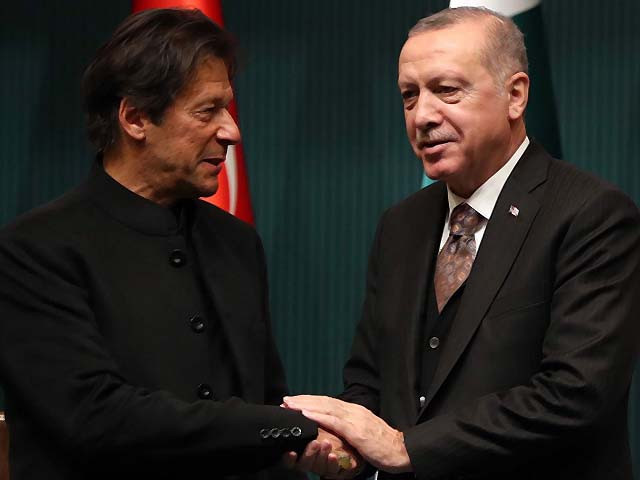The US’ newly promulgated policy of only processing Afghan resettlement applications from third countries has been met with opposition from Pakistan and Turkey which worry that this will encourage an uncontrollable influx of individuals across their borders. Both countries prefer that the US either processes such applications from within Afghanistan itself, or even better, proactively shapes the conditions to ensure their safety at home so that they’re not pressured to leave in the first place. Whether intended or not, the emerging dynamics compellingly remind one of Ivy League scholar Kelly M. Greenhill’s research on “Weapons of Mass Migration”.
This concept refers to what she describes as “the coercive use of purposefully created migration and refugee crises”. Those who are unfamiliar with it can refer to her publicly available 45-page academic article from 2010 that can be read at the Naval Postgraduate School’s website here. In short, the prestigious researcher purports to prove that different types of coercers have historically pursued various goals through these means ever since World War II with mixed rates of success. Ms. Greenhill’s concept is controversial among some who believe that it dehumanises its subjects while others praise it for its ingenious insight in explaining complex processes.
The relevance of “Weapons of Mass Migration” to the present analysis is that the US might be employing this stratagem for the purpose of pressuring Pakistan and Turkey through plausibly deniable means as punishment for their recent foreign policy recalibrations that some interpret as being disadvantageous to America’s national interests. Specifically, the US’ refusal to process Afghan resettlement applications within Afghanistan itself encourages such individuals to flee to Pakistan or Turkey (the latter of which via Iran which is accused of “passively facilitating” their transit by at the very least not stopping them en route to the Anatolian nation).
What makes “Weapons of Mass Migration” so difficult to defend against is the humanitarian element and optics thereof. Those who refuse to allow such individuals into their country on pragmatic or security pretexts risk being accused of immoral calculations that some might argue are even at variance with their international legal responsibilities. This throws the targeted state(s) into a dilemma whereby they’re pressured to either submit to possibly uncontrollable migrant flows or face potentially very serious consequences to their reputations.
It can also be challenging to prove that a suspect is responsible for catalysing or at the very least facilitating such crises. The US can easily defend itself by claiming that it’s due to simple pragmatism amidst the difficult security situation within Afghanistan that it’s unable to process resettlement applications within that country itself. It can also remind the international community that its members have the responsibility to allow refugees to receive safety within their borders, especially if they’re fleeing from a conflict zone like Afghanistan arguably is.
Pakistan and Turkey are so concerned about this possible “Weapons of Mass Migration” plot because both of them might not be able to care for any more refugees than they already are. Those countries host some of the largest such populations within their borders, which not only entails certain financial and social costs, but also carries with it unconventional security risks related to terrorists infiltrating their territories under the guise of being refugees or even simply the large-scale influx of foreigners destabilising the local state of affairs wherever it is that they ultimately end up residing as could be expected irrespective of the origin and destination states.
Some countries are more sensitive to these security risks than others, but there’s no denying that they exist regardless of however one feels about the moral and possibly legal obligations that members of the international obligation have to keep their borders open for such individuals. The most effective solution in these cases is to deal with the political, security, and socio-economic causes behind these migrant crises, but that requires significant international coordination and burden-sharing, especially when it comes to the financial costs involved. It’s much easier to talk about these solutions than it is to effectively implement them.
For these reasons, Pakistan and Turkey are bracing themselves for what can arguably be described as more “Weapons of Mass Migration”, which to be clear, isn’t intended as a so-called “dehumanising term” since every person is unique and should be respected but simply refers to the strategic role that these individuals inadvertently play in terms of the larger dynamics. In the US’ defence, it’s still participating in the Afghan peace process with the hope of promoting a political solution, but it also behaved irresponsibly by announcing its new third-party resettlement program without first coordinating with Pakistan and Turkey.
That’s why those two countries are justified in their opposition to the US’ policy since their ally can rightly be suspected of ulterior motives speculatively connected to punishing them for their increasingly independent foreign policies as of late. This puts Pakistan and Turkey in a difficult position since there’s no “silver bullet” solution to this “Weapons of Mass Migration” dilemma. The best that they can do is support refugee facilities along their borders in each neighbouring state, Afghanistan and Iran respectively. Even better, Iran should proactively prevent Afghan migrants/refugees from entering its territory for the purpose of reaching Turkey.
Pakistan, Turkey, and Iran should therefore work closer together to confront this unconventional threat. Islamabad and Tehran have the largest roles to play since they border Afghanistan, but Ankara is also affected since so many Afghan migrants/refugees might intend to eventually flood into its territory too. The US and its allies (including their media outlets) might attempt to pin the blame for any forthcoming crisis on those three countries, but the fact of the matter is that America is arguably the one most directly responsible since it destroyed Afghanistan and is now refusing to process resettlement applications from within that country.



COMMENTS
Comments are moderated and generally will be posted if they are on-topic and not abusive.
For more information, please see our Comments FAQ